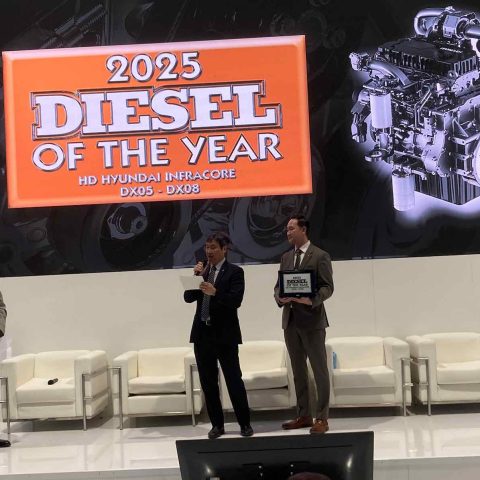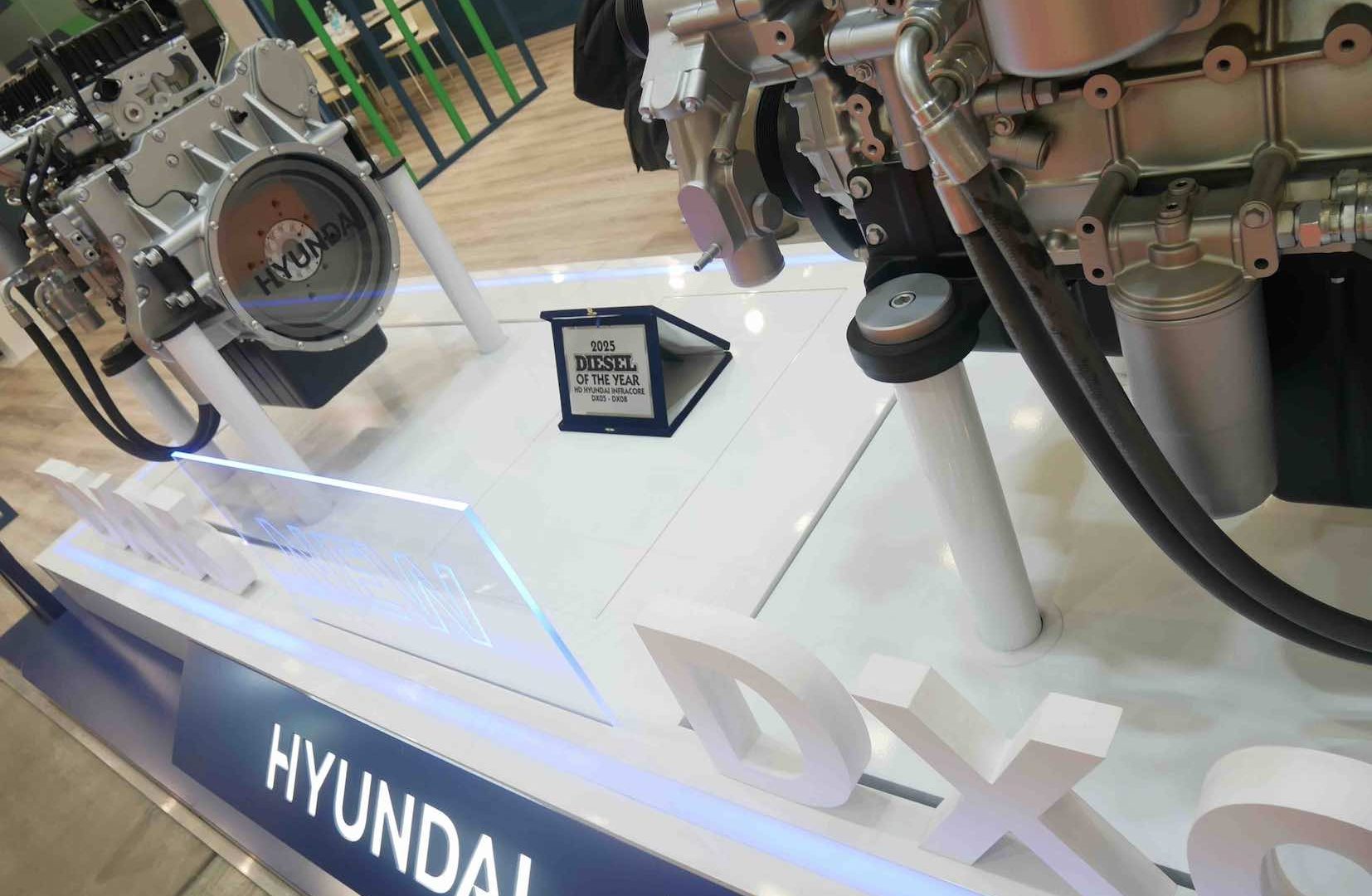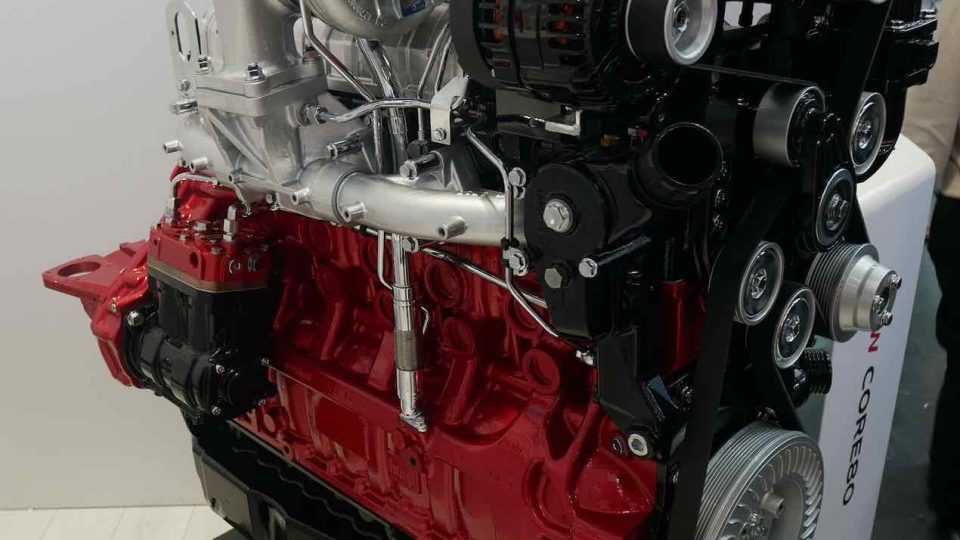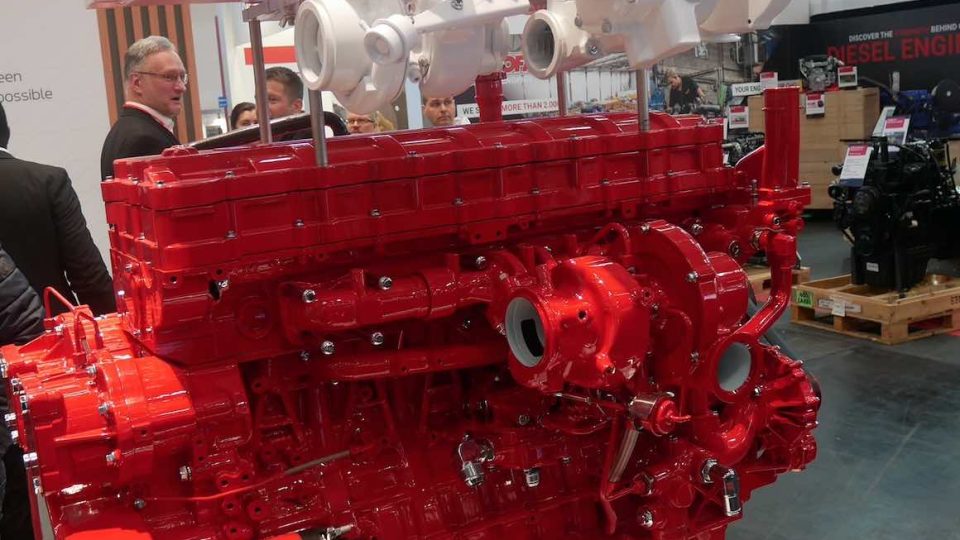Hyundai Infracore is Diesel of the Year 2025
At EIMA International HD Hyundai Infracore won the Diesel of the Year with the DX05 and DX08, 5 and 7.5 litres with a unit displacement of 1.25 litre

At the Quadriportico Hall at Bologna Fiere, Hyundai Infracore’s DX05 and DX08 were awarded Diesel of the Year 2025. Why did we use the plural to designate the winning engine? Because the DX series is made up of a 4- and 6-cylinder in-line diesel engines with a single cylinder displacement of 1.25 litre (BxS 110×132 mm).
The Diesel of the Year 2025 is called DX05 and DX08 and is from Korea
Wook Jung picked up the Diesel of the year 2025, Vice President/Engine Development Department HD at Hyundai Infracore (In the middle in the picture. Left, Fabio Butturi, editor of POWERTRAIN International; right, Hanyoung Jung, Head of Engine Division). Summarizing the winner’s point of view, here are some comments from the Korean company. “We are honored to introduce our engines at this 2025 DOTY. HD Hyundai Infracore’s new DX05 and DX08 engines represent a significant leap forward in our engine family, designed to enhance performance and efficiency beyond our previous engine models. Developed for a wide range of applications, from construction equipment to heavy-duty trucks and generators, DX05 and DX08 engines are set to redefine the standards of versatility and reliability. DX05 and DX08 engines, belonging to 5L and 7.5L class respectively, have been developed with the latest technologies to ensure eco-friendly and cost-effective operations. In developing the new DX engines, a key focus was on durability and performance. We have employed high-strength materials for major structural components, including cylinder block and cylinder head. For moving parts such as tappet, piston, and piston ring, wear-resistant materials were chosen to enhance durability. Furthermore, the adoption of 2-stage turbocharger in the intake and exhaust systems not only delivers 21% increase in power output compared to previous engines but also improves low-end torque. Our years of research and development in combustion technology have culminated in these engines. We’ve achieved emission reductions and fuel efficiency improvement of up to 8% compared to previous engine models through advanced combustion technologies, optimized fuel injection systems, and enhanced air management. Moreover, we focused on crafting a customer-centric product by enhancing serviceability and convenience. We’ve extended the maintenance intervals for fuel filter and oil filter from 500 to 1000 hours, and implemented features like super impactor, auto tensioner, and HLA (Hydraulic Lash Adjuster) to ensure maintenance-free operation.”
The motivation
“The strength of a nation is often measured by its influence on the global stage. Economic indicators alone don’t tell the full story. During last summer’s Olympic Games in Paris, a small country with a population of just 51 million secured the eighth position in the medal rankings. And do you remember Kim Ki-duck’s movies, such as 3-iron? And what about K-pop, which has bewitched a generation of teenagers? Electronics, telecom, batteries, electrification, digitalization: this country has also made its mark. You may have guessed that we are talking about South Korea. It’s no surprise, then, that Diesel of the Year honors the innovation of a brand that, over a decade ago, introduced the G2 series – compact engines progressively enhanced to meet market demands and emissions regulations. Today, this company launches the DX series, 4- and 6-cylinder units with 1.25 liters per cylinder.”

Some final thoughts
“The compact design fits a broad range of machine layouts, and advancements like the two-stage turbocharger and extended maintenance intervals for fuel and oil filters further highlight Hyundai’s engineering. Already available for G-Drive power generation applications, we foresee the potential for a marine conversion quite soon. But what truly defines a successful player in the technology arena is an engineering team capable of swiftly developing engines ready for any alternative fuel, continually refining combustion, and enhancing specific power and torque. This player can meet demanding schedules across full electric, hybrid, and fuel cell drivetrains, with proprietary expertise in software, remote control, and digitalization. This fits the Hyundai Infracore profile.”









